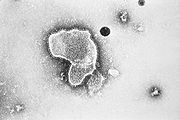- Respiratory Syncytial Virus
-
Humanes Respiratory-Syncytial-Virus Systematik Reich: Viren Ordnung: Mononegavirales Familie: Paramyxoviridae Unterfamilie: Pneumovirinae Gattung: Pneumovirus Art: Humanes RSV Taxonomische Merkmale Genom: (-)ssRNA linear Baltimore: Gruppe V Symmetrie: helikal Hülle: vorhanden Wissenschaftlicher Name Human respiratory syncytial virus (engl.) Taxon-Kurzbezeichnung HRSV Der Begriff Humanes Respiratorisches Synzytial-Virus (human. RSV, Typ A und B) bzw. englisch Human Respiratory-Syncitial-Virus bezeichnet ein umhülltes Virus mit einzelsträngiger Minus-RNA aus der Familie der Paramyxoviridae.
Inhaltsverzeichnis
Übertragung und Erkrankungsformen
Es wird meistens über Schmier- und Tröpfcheninfektion übertragen und verursacht Symptome im oberen Respirationstrakt: Schnupfen (Rhinitis, Erkältung), Husten, akute Bronchitis, Mittelohrentzündung.
Außer beim Menschen gibt es tierpathogene Stämme. Die Infektion von Kälbern mit bovinen RSV hat einen ähnlichen Verlauf wie beim Kleinkind und wird aus diesem Grunde zu Modelluntersuchungen zur Entwicklung von Impfstoffen und Therapeutika genutzt.
Eine Erkrankung erzeugt keine andauernde Immunität, es kann lebenslang zu Re-Infektionen kommen, die bei gesunden Menschen milde verlaufen.
Komplikationen
Die Infektion kann einen akuten Verlauf haben. In solchen schweren Fällen kann intensivmedizinische Überwachung notwendig sein. Bei Säuglingen kann es zu einem Krankheitsbild kommen, das einem Keuchhusten ähnlich ist und schlimmstenfalls zum Tode führt.
Behandlung
Zur Therapie eignet sich dann evtl. das Virostatikum Ribavirin, dessen Wirkung in Placebo-Studien jedoch nicht belegt werden konnte.
Diagnostik
Man kann das Virus mittels immunologischer Testverfahren (ELISA) nachweisen.
Vorbeugung
Für Säuglinge und Kinder mit hohem Risiko besteht die Möglichkeit einer passiven Immunisierung mit dem monoklonalen Antikörper Palivizumab, die aus Kostengründen nur speziellen Risikofällen vorbehalten ist. Diese Immunisierung erzeugt auch lediglich einen Schutz für wenige Wochen und muss deshalb während der RSV-Saison (Oktober/November und März/April) monatlich wiederholt werden.
Eine Impfung mit attenuierten oder abgetöten Viren ist nicht möglich.
Weblinks
- Erkrankungen durch Respiratory Syncytial Viren (RSV) – Informationen des Robert Koch-Instituts
Wikimedia Foundation.

